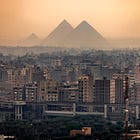Make Egypt Pharaonic Again
A growing movement would have you know: True Egypt is not African, Arab or Muslim.
Shimaa al-Youssef in Cairo

As Egypt grapples with a worsening economic crisis, rising inflation and deepening authoritarianism, the country is witnessing the rise of a reactionary movement that seeks solace in an imagined past.
The “Children of Kemet”, a social media fuelled current of nationalist fervour, has gained momentum by calling for a return to pharaonic identity as the singular essence of Egyptianness – rejecting both its Arab-Islamic and African historical anchors.
The movement’s name evokes ancient Egypt; “kemet” means black soil, referring to the fertile Nile valley and its rich, black soil. But today, the Children of Kemet seek to redeploy that imagery in an attempt to sever Egypt’s ties with its African and Islamic lineages.
While borrowing the language of heritage and authenticity, the movement resembles a familiar global pattern: right-wing nostalgia for civilisational greatness – where disaffected publics retreat into sanitised versions of the Roman Empire or Viking lore, for example – and romanticising a golden age to justify exclusion in the present.
The rhetoric has found traction in a time of serious socioeconomic strain, when many Egyptians are seeking both answers and scapegoats.
“By limiting Egyptianness to pharaonic origins, they ignore subsequent historical eras shaping our national identity, which entrenches racism, discriminates between citizens, threatens national unity and undermines the notion of citizenship,” says archaeologist Mahmoud Farahat, adding that the group is engaging in a “selective reading” of the past.
The movement attempts to sever Egypt from its layered cultural and historical identities, which include not just pharaonic heritage but Islamic, Arab and African lineages too. Its adherents reject any framing of Egypt as “African”, and accuse other Africans – especially Sudanese and Ethiopians – of falsely laying claim to Egypt’s ancient past.
“This ‘nationalist Salafism’ is intellectually weak and harbours illusions of racial purity,” says Ahmed Sultan, a regional security and terrorism studies researcher, adding that such movements are a racialised fantasy that mirrors far-right movements elsewhere, where they become an expression of a deep crisis in societies facing socioeconomic hardships and political authoritarianism.
The movement – decentralised and unofficial – began as a Facebook page on historical information in the late 2010s by content creator Mohamed Habib. It has since splintered into various groups with hundreds of thousands of followers across platforms like X, Facebook and YouTube, under names like “KMTology”, “Egyptian Not Arab”, and “Eye of Horus”.
The group has also influenced public discourse and events in the real world. In 2023, Children of Kemet supporters sought and won the cancellation of concerts by American comedian Kevin Hart and rapper Travis Scott, accusing them of promoting “Afrocentric” and “satanic” narratives, revealing a growing power to set cultural red lines.
But the movement’s rejection of Egypt’s Arab-Islamic identity has drawn sharp criticism from religious leaders, who condemn it as a new form of “paganism” and foreign influence.
“These currents are Western and Zionist projects targeting the unity of our nation by stripping Egypt of its Islamic heritage and dismantling its collective consciousness,” says Atiya Lashin, professor of Islamic jurisprudence and a member of the Fatwa committee at Al-Azhar University.
At the same time, the Children of Kemet’s messaging has dovetailed with a growing xenophobia. Egypt now hosts nearly a million refugees, with those from Sudan and the Horn of Africa being most prominent. The movement refers to them as “Kushites”, a group that conquered Egypt in the 8th century BCE, and to Syrians and Palestinians as the “Hyksos”. Both terms are seen as highly derogatory in the local context.
Internal schisms are also emerging. Former member and visual artist Enas al-Deeb left the group after their repeated attacks on Islam, although she says she “still agrees” with the group’s opposition to the government’s decision to accept successive waves of asylum seekers from Sudan. Other movement figures declined requests for comment.
In the end, what looks like a revival of national pride may be a symptom of contemporary despair, seeking to rewrite the present by redrawing the borders of belonging. As in other parts of the world, this nostalgia-driven ethos offers a seductive clarity amid chaos, rejecting complexity and diversity in the pursuit of a specific kind of genealogical purity.








This seems to echo Tunisian President Kais Saied’s 2023 racist, anti-migrant rhetoric in the midst of domestic economic challenges…